
Andrew Haigh may not be as well known as Gus Van Sant, Greg Berlanti or Dustin Lance Black but he is every bit as talented and important to LGBTQ cinema. His gay romance Weekend earned wide praise on both sides of the Atlantic, while the drama 45 Years earned an Oscar nomination for lead actress Charlotte Rampling. His work on the HBO show Looking and subsequent film adaptation also helped cement his reputation as a young director on the rise.
Haigh returns to the big screen with Lean on Pete, a coming-of-age drama featuring lauded actors like Charlie Plummer, Chloe Sevigny and Steve Buscemi. Lean on Pete opens April 6 in theatres everywhere.
In between collecting accolades for his latest directorial outing, Haigh sat down with Queerty to discuss Looking, Lean on Pete and gay life generally.
I saw Lean on Pete last week with my bf, and we were both surprised by the departure from your previous work which is pretty sexually charged. I’d say there’s a theme in your work of people who are sort of craving love, people who feel isolated and are trying to connect with someone else. Lean on Pete certainly fits that mold, except it’s about a boy and his horse.
How about we take this to the next level?
Our newsletter is like a refreshing cocktail (or mocktail) of LGBTQ+ entertainment and pop culture, served up with a side of eye-candy.
Well, I think to be honest, it’s that notion of lonely people needing to connect and finding safety and find understanding and find a place to be nurtured. And in many ways, whether it’s in a sexual relationship or a relationship with a partner, it’s pretty much the same instinct that’s driving him. In many ways, what Charley needs in his life—to feel loved, to feel cared for, to feel safe—are all the same things that Russell needs in Weekend or Kate needs in 45 Years.
Yes.
Oddly, even though I completely agree with you this is such a different film from those other films, it’s still driven, I suppose, by the same human need to not be alone. And I think that dictates all of my work to some degree. And what I actually found really interesting about this, is that it’s exploring that need without it being within a relationship context whether it’s sexual or whatever. It’s taking it away from that, almost like exploring and highlighting that essential need that’s at the bottom of everything.
There’s a show biz saying: never work with kids, animals or plunging necklines. And I’m pretty sure—
[Laughter] I have never heard that! The plunging necklines bit! I’m going to use that.
And Lean on Pete has all that. The story does hinge on a friendship between a kid and an animal. So, what for you personally was hardest about translating that relationship into visual prose?
I think one of the hardest things was that I didn’t want this to be a sentimental version of that story.
Right.
So you know, there are other stories about kids and animals, young girls and horses, and all that kind of thing. I didn’t want this to be a sentimental version of that kind of story The book certainly isn’t; the book is grounded in reality, and I sort of quite liked how it’s setting up this idea of “oh, it’s going to be a boy and his horse,” and then it becomes something different. It’s about the horse but it’s really not about the horse at all, it’s about Charley, and it was about trying to find that balance, but at the same time, showing the connection between Charley and the horse is really important. So it’s about trying to find the right visual language for that. So, for example, there are no close-ups of the horse looking at Charley. And that seems—it’s actually a very simple way to take away a sentimental version of this story. So you don’t see the horse looking at Charley in reaction shots. You’re not trying to make the horse into a human being. It’s always still a horse.
Right, though let it be said the horse has expressive eyes.
And it’s called “white eyes.” We auditioned three different horses, and automatically I was like “that’s the one” and the trainer said that’s because the horse has more white in his eyes. And so, naturally, as a human, you’re drawn to that because it seems to have more human eyes. I love how human beings are just drawn to things that look like us.
That is interesting.
Charlie [Plummer, who plays the lead] spent three weeks, I think, working with the horse in the mornings, trying to develop a relationship with it. Obviously, he needed to be able to control the horse, and show confidence with it.
And Charlie Plummer, who plays Charley in the film, gives a great performance.
He’d just turned 17 while we were filming. So he was 16 when we started.
Did that affect how you treat him as an actor, the way you approach your direction?
I think it does a bit, and I was really nervous about it. I’d done a short film a long time ago with kids that were like 14, 15, and that was definitely—I remember finding it quite a struggle, because you can’t talk to them like you talk to an adult. Part of my way of directing is being open about my own feelings and situations. With kids that’s slightly trickier, I think. So I think I had to find a different way to work. But the great thing about Charlie is that he’s so smart, and really, you know, like, grown up, and understands the character, and what the conversation needs to be about the character. And it was really, really an incredible process. And he’s so talented.
Related: ‘Love, Simon’ director Greg Berlanti: “The best actor in the room isn’t always white, thank god.”
Do you ever have aspirations to do one of these big studio projects? You know, these franchise epics—superheroes, Star Wars, James Bond?
I think, no.
Really?
If I was going to do a version of that story it’d be so not the version that anyone would want. That they’d certainly not want to give me $100 million, $200 million—whatever these movies cost. I mean, the truth is, to make one of those films—and I actually love those films to watch. I really enjoy them. But I don’t think they’re the kind of films anyone would ever pay me to make. They’d be these quiet versions where there’s not much action, and superheroes just sit around and chat. So it probably wouldn’t be the best version.
That sounds interesting to me.
It does sound interesting to me. You never know, maybe one day.

Well, we’re certainly seeing progress with superhero films. Last year Patty Jenkins had a hit with Wonder Woman, which is the first big female-driven superhero film. Black Panther, earlier this year from an African-American director, Ryan Coogler. Do you think the world is ready for a queer-themed hero from a queer director?
I think that would be lovely to see. I mean, who wouldn’t want to see a gay superhero. That would be incredible. I don’t know, I don’t think we’re quite there yet, to be able to tell that kind of story, to be honest. Not as the lead. I think we’re in the right stage now where you can have a supporting queer superhero in a story, and I wish you could. You should be able to, but it’s a tough sell. The truth is, if a studio is putting $200 million into a movie, they want to make sure that it sells, not just in America, but in China and around the world. And I certainly don’t think that China is ready for a gay superhero.
Jumping back in your career a bit, besides your films, you were also part of Looking, which, though it only ran two seasons, is highly regarded. What made you want to do a series about gay men, sort of, on the prowl—it seems they’re on the prowl for sex, we know they’re really on the prowl for love. And have you encountered a lot of blowback for it, as a person, as a director, that people don’t want to hire the guy who did the show about guys who are trying to hook up?
I mean, it came to me—Michael Lannan who created the show, and HBO came to me just after a long weekend. And to be honest, it was just like, you know, ‘oh my God, this is incredible.’ I’d just done a movie with like 15 people that cost $65,000 and now you’re offering me the pilot of an HBO show? I was like, yeah of course. And I enjoyed it so much—working on Looking. It was a really interesting environment to be in. It was such a gay environment. So many of the crew, the heads of departments, the actors, and let’s face it, on set, I’m often the only gay person on my set. So to be surrounded by all of those people, and we all loved working on the show, we all cared about it. So it was a fantastic experience. And I actually think it’s only done my career good. And if it hasn’t, I don’t really care, you know?
Yeah.
It was one of those shows, I thought—I want to do this, it’s good. I’ll enjoy it. And you know, we got some fury at the time from certain segments of the world about, you know, they didn’t like the show, the show isn’t any good, that kind of thing. So it was a slightly anxious-ridden time as well, but I don’t regret it for a second.
Along those same lines, there’s a lot of talk about homophobia in showbusiness, which seems somewhat ironic, but it’s there. Do you ever find yourself sort of pigeonholed as a “gay director?” Have you experienced homophobia within showbusiness from certain elements of it—maybe not from other creatives, but from agents, executives, lawyers or whoever?
I don’t think I’ve ever experienced it in any definitive sense. I think there’s probably a world in which they see you as slightly different. And that’s the truth of it. So they maybe don’t think you can do certain things, or they maybe think you can do other things. So I think that you get that sometimes. And you know, the movie industry is a very masculine industry. It’s very straight. It’s very white, and it’s very straight. So if you’re a woman, or you’re gay, or a person of color or any of those things, you feel slightly isolated within it. You can work on a set, you know, even on 45 Years, I think I was the only person on the whole set that was gay. And it’s fine because I was the director, so it doesn’t really matter. But it can be tough for anyone that’s queer and working on a film set. You’re not surrounded by gay people, that’s for sure.
True…
So you know what it’s like being a gay person. You often feel different to other people. I think that’s no different in the film industry.

Have you ever encountered a difference in the way that Americans see sexuality vs. Europe?
I don’t know that it is that much different to be honest. I think because—look, Weekend did well for what it was, and then 45 Years came out. I feel like it’s certainly not done me any harm. And you know, I’m so openly gay. It’s not anything I hide. My work has been gay, so I feel like I never hear anything negative to my face. Maybe behind my back.
Do you consider yourself a role model? Other directors like Greg Berlanti, screen writers like Dustin Lance Black—they’re very open about the fact that they’re gay, married to men, having children.
I don’t, personally. I mean, look, I’m British. We feel uncomfortable about the notion of being a role model for anybody. We feel a bit like “god, that feels awful.” But maybe that’s just more a British thing than anything else. Look, I just try to do what I do with my life. And you know, I’m not really on social media, particularly. I was on Twitter, but I came off Twitter. I don’t feel like that’s what my role is, so I don’t worry too much about it, but neither do I…I’m not afraid to talk about those things either. I’m not afraid to talk about being gay or anything like that. It’s not like I ever feel a need to hide it. I would never. I’m too flawed to be a role model.
All role models are flawed. You don’t have to be perfect.
That’s true. But the best role model to have is a flawed role model. Then it’s actually attainable.
You had a great role model early in your career named Ridley Scott, working on films like Black Hawk Down and Gladiator. What did you learn from sitting around with this guy, who’s legendary? Alien, Blade Runner—he’s an amazing director. And what advice could you pass on to young, aspiring gay filmmakers?
Well the hilarious thing is, I worked on those films, and I saw Ridley a year ago, and he had no idea who I was.
Oh, no…
When you work on these big films—and I was an assistant editor; I wasn’t lead editor—you’re in a room in the back and you barely even see the director. So it’s this strange thing. But you do learn huge amounts working on those films. You learn all these things as you go along. And I think with all of those people, you’ve just, you’ve got to be passionate about what you do. You’ve got to care about it. And you’ve got to be doing things for the right reason. If you’re doing it for the sake of money or fame or even to improve your self-esteem, you’re never going to get anywhere. You’ve just got to really care about the story you’re telling. And that’s the thing—whether you’re gay or whether you’re not gay, I think that the best advice you can ever give to any filmmaker is just stay true to what you want, and what it is you’re trying to say.
Right now people seem more obsessed by the fact that the president had a one-night stand with Stormy Daniels than colluding with Vladimir Putin. Having worked on projects that deal very frankly with sexuality, and having lived in Europe and in America, why are people so fixated on sex?
Well I think it says we are obsessed by sex, and I think that’s the truth of it. Like, I think, say, in the UK if there’s a sex scandal, that’s all anyone cares about. All anyone will be interested in is the sex scandal. And you know, it’s a sad state of affairs—and maybe it’s because the world is so complex, and because there’s so much trauma—in such a bad state at the moment that we’re drawn to what we understand. Things that are simpler. And we can get obsessed by those things rather than trying to deal with, for example, mass inequality. Or the fact that there’s a huge homeless problem. Or, whatever it is that is fundamentally tearing our countries apart. Instead, we’re interested in sex scandals. I think—all of us—it’s a lot easier to not think about the really difficult questions and try at what seems more titillating and exciting.
That’smart—
Plus, we all like to have sex.
Lean on Pete opens in cinemas April 6. Looking: The Movie is available on Amazon and HBOGO. 45 Years streams on Amazon, iTunes, YouTube, Vudu and Showtime ON DEMAND.
Watch the Lean on Pete trailer below:


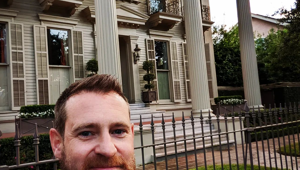
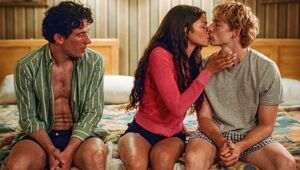

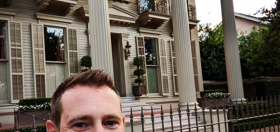

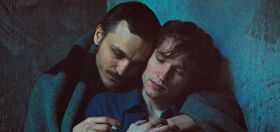
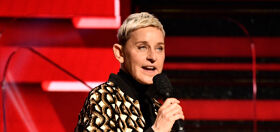

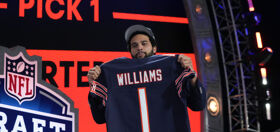









drewthemoviefan
Great interview. This is the kind of stuff I like to see on Queerty, not garbage clickbait.
Cylest Brooks
Thanks for the feedback! We appreciate it!
CAxlRose
“I mean, it came to me—Michael Allen who created the show, and HBO came to me just after a long weekend.”
C’mon, Queerty. You’ve interviewed the guy. His name is Michael LANNAN.
chris_clb614
I don’t think four theatres (according to Box Office Mojo) counts as nationwide. Where I live, I’ve got the choice of Acrimony, Isle of Dogs, or A Quiet Place.